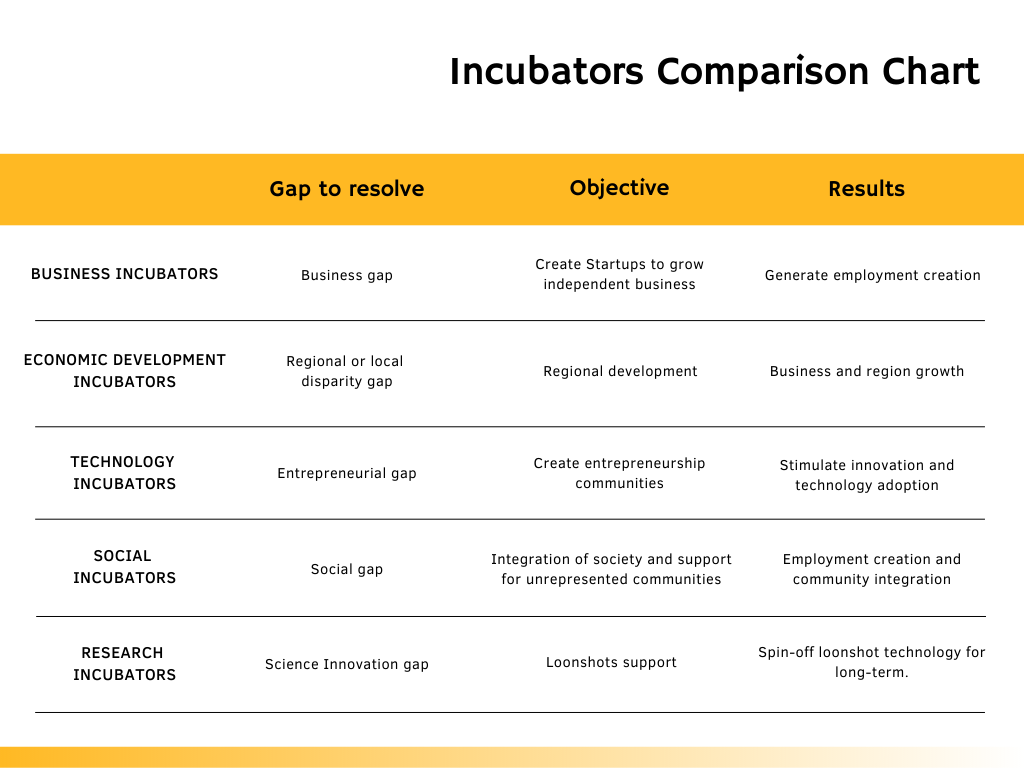In recent years, we worked with multiple incubators in local towns and cities to understand and help the creation of a more dynamic innovation ecosystem that makes the community excel and provides their citizens a better growth.
During that time, we evaluate the impact on the local communities and if it is worth persuading such ventures from local municipalities and counties.
The results are astonishing. The impact in the community can be seen in 5 year period where choosing the right strategy can significantly impact.
Defining what type of incubators to build
Deciding what incubator strategy is the first step to success. Incubators are built considering the results you want to obtain.
In the table below, you can find the different types of incubators, helping you to decide what to choose based on three items: gap to resolve, objective, and results.
The results are always based on the gap that wants to be resolved in the region.
- Employment creation requires growth in the businesses running in the region.
- Support regional growth when you have a good workforce in the cities and towns, but they mainly work in other regions to bring businesses closer to the people.
- The local communities should impulse the entrepreneurship ecosystem to stimulate innovation from college graduates and students.
- The social gap in some regions needs to be addressed to support social entrepreneurs to build non-profit startups to support and help the growth of marginal society.
- Loonshots are complex and take time, but building in this can create a new industry in the region that can make a hotspot in the country.

Value proposition
The incubators value proposition is to support the entrepreneurs in three main areas:
- Supporting: incubators support local businesses helping them to avoid competition and other regions threads with agreements between cities, towns, and/or counties.
- Connecting: incubators connect businesses with other businesses and communities that need their support.
- Educating: bring mentoring, workshops, meetups, and education programs into one place so they can grow faster.
Incubators offer various services, the most common being co-working, education programs, a pool of mentors, and access to deals and propose to launch the business.
Factors that help incubators succeed
Multiple areas can help incubators succeed or fail though they can be understood in the planning process to improve the success rate.
Areas to consider:
- A clear understanding of service offered in multiple topics depending on the nature of the businesses created.
- Staff with a good background to offer and support services to businesses in the community.
- Mentor network with different areas served with interest from the businesses.
- Cost and fees for the services offered are reasonable in the region.
- Funding for government and agencies to support growth.
Tools that support your businesses
There are many reasons that we see many, if not most, incubators supported by simple tools that are low-cost and free to reduce costs. The experience shows that having a low-profile set of tools could produce a high business engagement churn and support growth.
Current studies showed that tools are crucial to having a successful incubator. Some of these tools are:
- Video conferencing like Zoom, Google meet, and Microsoft Teams
- Web site with updated design and information aligned with the offerings and pictures or common areas of use.
- Tools to manage the community, members, mentoring and bringing most of the services available in one place. The best example is Team Coaches, which offers this and more solutions.


